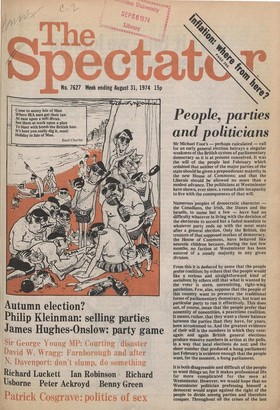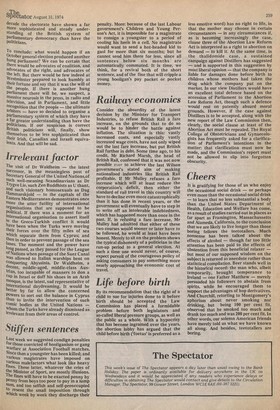People, parties and politicians
Mr Michael Foot's — perhaps calculated — call for an early general election betrays a singular weakness of the British system of parliamentary democracy as it is at present conceived. It was the will of the people last February which ordained that neither of the major parties of the state should be given a preponderant majority in the new House of Commons; and that the Liberals should be allowed no more than a modest advance. The politicians at Westminster have shown, ever since, a remarkable incapacity to live with the consequences of that will.
Numerous peoplesof democratic character — the Canadians, the Irish, the Danes and the Israelis, to name but a few — have had no difficulty whatever in living with the decision of the electorate to accord but a faded mandate to whatever party ends up with the most seats after a general election. Only the British, the creators of that supposed mother of democracy, the House of Commons, have behaved like neurotic children because, during the last few months, no faction at Westminster has been assured of a steady majority in any given division.
From this it is deduced by some that the people prefer coalition; by others that the people would like a serious and straightforward kind of socialism; by others still that what is wanted by the voter is stern, unremitting, right-wing patriotism. Few, alas, suppose that the people of this country want to preserve the traditional forms of parliamentary democracy, but trust no particular party to run it effectively. This does not, of course, mean that the people prefer that nonentity of nonentities, a peacetime coalition. It means, rather, that they want a closer balance between the parties than they have, for years, been accustomed to. And the greatest evidence of their will is the numbers in which they vote: again and again British general elections produce massive numbers in action at the polls, in a way that local elections do not; and the sheer number that produced a hung parliament last February is evidence enough that the people want, for the moment, a hung parliament.
It is both disagreeable and difficult of the people to want things so; for it makes professional life far more complicated for the men at Westminster. However, we would hope that no Westminster politician professing himself a democrat would argue against the right of the people to divide among parties and therefore conquer. Throughout all the crises of the last decade the electorate have shown a far more sophisticated and steady understanding of the British system of Parliamentary democracy than have the politicians.
To conclude: what would happen if an October general election produced another hung parliament? We can be certain that there would be advocates of coalition, and advocates of the right, and advocates of the left. But there would be few indeed at Westminster prepared to look humbly at their fortune and say that it was the will of the people. If there is another hung parliament there will be, we suspect, a massive neurosis in the press, in radio and television, and in Parliament, and little recognition that the people — the ultimate arbiters — have so decided to organise a Parliamentary system of which they have a far greater understanding than have the Politicians. If our suspicion is correct British politicians will, finally, show themselves to be less sophisticated than their Irish, Canadian and Israeli equivalents. And that will be sad.



































